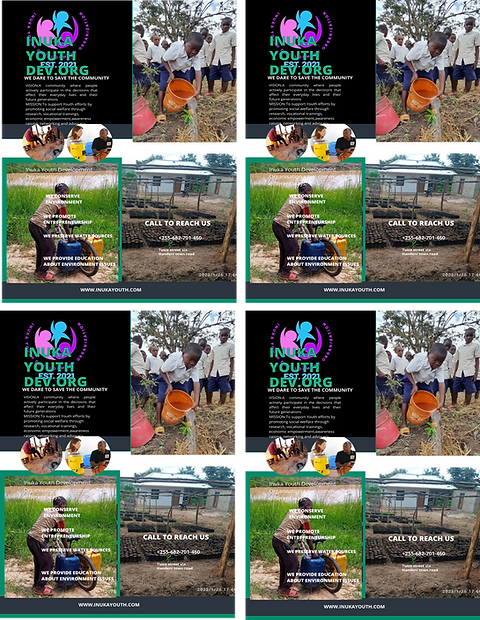
WELCOME NOTE
We are saving community in different ways join us
We are non profit organizations with Registration Number 21NGO/R/2977 operated in Handeni District -Tanzania, and were very committed to save Community and entire world in different ways. We invite everyone to join us to flourish our beloved mother Earth.
CLEAN AND SAFE WATER PROJECT-HANDENI TANGA, TANZANIA
We looking partners who could join hands with us to provide safe and clean water here in Handeni-Tanga.This project will benefit the community and world as whole in different angles such as:– A supply of clean safe water for communities– Reduced incidence of waterborne diseases– Less time and effort spent collecting wood to boil and sanitise the water– Reduced expenditure on wood fuel, leaving money free for other household expenses– Reduced pressure on local wildlife and ecosystems due to reduced deforestation


SUPPORT THE CLEAN COOKING THROUGH IMPROVED COOK STOVES TO REDUCE DEFORESTATION IN HANDENI DISTRICT-TANZANIA
More than 90% of Tanzanian households rely on biomass (e.g. wood & charcoal) for energy; it is mainly used for cooking and occasionally for space and water heating. Wood and charcoal are obtained almost exclusively from the forest (90%), which is a key driver of deforestation in Tanzania. The impact of deforestation is widespread, affecting the livelihoods of local people – mainly the rural poor - where it disrupts important environmental functions, such as water and soil nutrient retention.In Tanzania, cooking is traditionally carried out indoors on thermally inefficient 3-stone fires, which results in incomplete combustion and the production of large amounts of smoke and indoor air pollution. Indoor air pollution has been linked to a range of health problems such as acute respiratory infections (ARI) in children, chronic obstructive lung diseases (such as chronic bronchitis and asthma), lung cancer and neonatal complications.

About Us
About us
We are non profit organizations with Registration Number 21NGO/R/2977 operated in Handeni District -Tanzania,and we are very committed to save the Community and entire world in different ways but now we're engaging into Conservation by planting indigenous trees to the burnt Tarawe Forest reserve and Serewa Forest for the aim of restoring the nature and various species which has been lost for many years ago.
Also were doing conservation by planting fruit trees to the public school's reserved areas at Handeni District.
Your warmly welcome to join us to save entire world 🌍🌍.



We are committed to meet the UN's Goals

Frequently Asked Questions
For how long is the land protected and under what agreement?
Thanks to our staff team's hard work, we have developed deep and respectful relationships in all levels of community and government departments. We make concerted efforts to form and secure written agreements with a clause leading to a perpetual forest. Further, to ensure protection in perpetuity, our funding strategy includes wages for guards while we restore forests.
How do you ensure the protection of your trees? How do you know your trees will not be cut down again?
We make every effort to ensure the forest we plant becomes permanent and sustainable. Towards this end, we have implemented the following steps:
-We work carefully with all levels of the government to secure written agreements designating the restoration sites as protected in perpetuity.-We do not plant in logging areas. There is never a 100% guarantee that some form of illegal harvest will not occur. However, we do everything within legal limits to ensure the restoration sites are guaranteed to stand in perpetuity.-We hire local communities to plant the trees. In this way, we alleviate extreme poverty within the impacted community. The community members now have an economic incentive to ensure the well-being of the restoration project. They also have a sense of “ownership” over the trees and restored forest, and they protect it with great care.-We plant agroforestry species (fruit, fodder, and construction species designed to provide food security and benefit legitimate human needs). Over time these trees become a source of sustainable income.-We do all possible to supply the locals with alternative fuel sources (fuel-efficient dry wood stoves and solar parabolic stoves), which reduces and/or eliminates their dependence on charcoal.-We hire forest guards as part of the labor force.-Most significantly, we have seen the locals fall in love with their forest. They also recognize and benefit from the restored forest through increased fisheries, improved farming, cleaner water, and the formation of microenterprises.
Are the trees planted on publicly or privately-owned land?
The majority of our forest restoration projects occur on government-owned land under the local community's direct authority.
What are your restoration methods?
We use various restoration methods such as seedling nurseries, bare-root transfers, and mangrove propagule planting. Each planting sites uses one or more of these methods depending on the species of trees that are native to that given site.
What kind of trees do you plant?
We plant a variety natives tree species; these vary from site to sites. We do not plant or introduce any invasive species at any of our project sites. We also plant a percentage of agroforestry species for sustainable community use. This prevents the community from going into newly restored forests and provides greater community benefit and involvement in the project.
Where do you purchase the seeds and seedlings?
We collect most seeds from nearby remnant forests. If required to supplement the seeds we collect, we purchase seeds from local, trusted seed banks. We do not purchase seedlings; we grow our seedlings in our nurseries to ensure quality and germination rates.
















